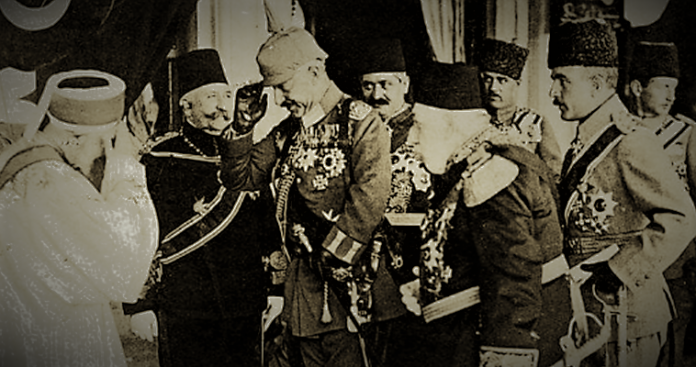Kostas Melas: Germany-Turkey: Confirming a timeless geopolitical romance
05/09/2020
Berlin’s persistent attempt to prevent effective sanctions against Turkey (due to its refusal to withdraw the Oruc Reis) brings back to the fore the long-standing geopolitical love that connects Germany with the Ottoman-Turkish factor. We have seen this relationship in recent years on the occasion of Erdogan’s decision to send thousands of migrants en masse to Evros and the coasts of Asia Minor in order to cross violently into Greece and Europe. We see it again today.
For post-war Germany (in a sense also for the German Empire since its founding in 1871) economic relations are a very important factor of interdependence at the transnational level. According to the Germans, economic power is a factor of exceptional efficiency, in order to consolidate their dominance over other countries. Regardless of whether, for Germany, sovereignty is ultimately achieved through politico-military power, when this is not possible, the economic dependence of other countries is a necessary condition in order to create the conditions for ultimate dominance.
German-Turkish relations date back to the era of the German Empire and the corresponding Ottoman Empire (late 19th century) and continue to this day. Their relations are political, military, and economic. The two empires coexisted at that time based on their strategic complementarity, but with different perspectives.
William’s new German empire, a rising power in central Europe, sought to compete with England and France. The other empire, the “Sick Man of Europe”, was trying to avoid the looming political and economic collapse. But the Ottoman Empire held a strategic geographical position at the time because it controlled the Suez Canal. In 1896, Emperor William began Germany’s new colonial policy (following the expulsion of Chancellor Bismarck) in order for the empire to “find a place under the sun”. In this context, he showed a special interest towards the Ottoman Empire, the support of which he needed.
The Orient Express has connected Western Europe with Istanbul since 1889, and Sultan Abdul Hamid accepted a request from Emperor William to extend the railway line to Baghdad via Anatolia. The goal was to later to extend it as far as Basra so that it would reach the Persian Gulf and gain access to India. He wanted to build a German naval base in Basra, which would put England in a difficult position.
Germany opened its doors
At the same time, a branch was planned for Damascus that would continue to Medina. The network would serve Germany’s economic aspirations in the Ottoman Empire, but would also facilitate access to German colonies in East Africa. It would also have easy access to the raw materials needed by the fast-growing German industry.
The acceptance of the plan by Sultan Abdul Hamid was aided by the fact that Germany showed itself as an equal economic partner seeking only economic cooperation, in contrast to the British and French who pursued colonial policy and held the largest share of the country’s public debt. Germany opened its doors and became the first economic partner of the Ottoman Empire in Europe. This cooperation turned into a close defense agreement, with the result that the Ottomans participated in the First World War on the side of the Central Powers.
It must be said that the Germans played an important role in the Ottoman Empire from the time of Tanzimat, in its attempt to modernize it starting during the middle of the 19th century. More specifically, they played a role in the organization of the Ottoman army and in general in the demands for modernization made by the rising social classes with a bourgeois and nationalist orientations. With the end of World War I, both empires were transformed into Republics with the well-known results.
Back to Turkey
After the end of World War II, the Federal Republic of Germany turned to Turkey again as part of the reconstruction of its society and economy. While France, England, and the Netherlands were able to use labor power from their colonies, Germany turned to the labor force of the southern European countries on the one hand but also to the Turkish labor force from 1961 on the other. By 1969, about 1,000,000 Turkish workers were employed in the German industry.
Until 2001, the law on German citizenship was based on the concept of jus sanguinis. This year the law was changed (reform of the Schroeder government) and the majority of Turkish immigrants (about 3.5 million in 2010) received German citizenship and the right to vote. This fact, of course, gave more weight to the Turkish minority, than it had before.
Germany is the most important destination for Turkish exports (in 2017 Turkish exports amounted to 17.4 billion dollars). Turkish exports to Germany consist of vehicles, various car parts and accessories, and textiles. Respectively, the main imports from Germany are machinery, electronics, vehicles, drugs, optics, and various parts and components for the manufacture of car engines, as well as material for railways. Also important are the imports of weapons systems from Germany. In the first eight months of 2019, such imports to Turkey amounted to 250.4 million euros.
80,000 German-Turkish companies
While, as we said about Turkey, Germany is the first country for its exports, for Germany respectively Turkey is in 16th place. The volume of German exports in 2018 amounted to 22.8 billion dollars. In other words, there is an asymmetry in trade between the two countries, which is clearly in favor of Germany.
Also, this asymmetry is seen in the volume of Foreign Direct Investment between the two countries. In the period 2002-2018, Germany has invested $ 9.469 billion in Foreign Direct Investment in Turkey. Turkey, respectively, has invested $ 2.443 billion in Foreign Direct Investment, in Germany, according to data from the Central Bank of Turkey.
Behind these investments are about 80,000 German-Turkish companies operating in Germany, with an annual turnover of about 52 billion euros. About 500,000 people are employed in 50 different economic sectors. On the other hand, about 7,500 German companies are active in Turkey.
The volume of trade between the two countries amounted to about $ 40 billion in 2017, representing about 1.5% of German international trade and 10% of the corresponding Turkish. Germany’s total exports in 2017 amounted to about 1.4 trillion. Turkish exports, respectively, to $ 156 billion. At the same time, Germany sees the Eastern Mediterranean beginning to rebuild geopolitically.
Using the EU as a vehicle
The Germans see that they are being excluded from developments in the Mediterranean. Once again, they are trying to use the EU as a vehicle to achieve their goals. In this case, they are trying to enter Libya, but through the window, rather than the front door. Berlin believes that Paris is trying to become the dominant European power in the Mediterranean. It is noteworthy that any initiative that did not start with German blessings was condemned by Berlin. Let us not forget that Germany, in addition to lacking natural resources, also lacks a large coastline.
Control of the Mediterranean is therefore a priority for Germany. In order to curb any reaction from Italy or even France, Germany is resorting to bargains concerning the Eurozone and fiscal adjustment. In other words, Germany is trying to intervene in developments in the Eastern Mediterranean through the well-known “peace initiatives”. In this context, it undertook the failed initiative for Libya in early 2020.
In all this planning, Turkey – in the eyes of the Germans – is a player they can work with. In light of history, it seems that close relations have been forged between the two countries, which are still valid today. In fact, I would risk saying that both Berlin and Ankara would like to see their relations return to the level of the early 20th century. And judging by the current attitude of Berlin, this is already happening.





